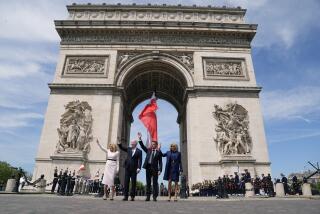DIPLOMACY : Franco-American Rivalry Brings a Chill in Relations
- Share via
PARIS — If Frenchman Henri Leconte wins his match today, it will set up a France versus the United States final Sunday in the French Open tennis tournament here. That’s the main sports story in France these days. But in the international political arena, a similar rivalry is developing: France versus the United States in just about everything.
After a decade of relative tranquillity, relations between the French and American governments have reached a low point that some contend is unequaled since the contentious rule of France’s President Charles de Gaulle.
Led by two foreign secretaries who can’t stand each other (American James A. Baker III and Frenchman Roland Dumas), French and American officials have lately taken to sniping at each other on practically every issue, from Yugoslavia to farm policy to the Los Angeles riots.
The situation deteriorated to such a point this week that a senior French official invited American reporters for a briefing to calm what he described as the “spiral of tensions” and “mountains of misunderstanding” between the countries.
From the perspective of American diplomats here, the chill in Franco-American relations can be traced to French discomfort with a unipolar world in which the United States dominates. “Ever since the collapse of the Soviet Union we have had more problems with France than with any other ally,” one American envoy said.
The French view is that the United States has failed to grasp the importance of the emerging economic and political union of European states. The knee-jerk American reaction, French officials say, is to blame France for instigating conflicts that are actually European-American issues.
“Many Americans don’t understand that there has been a Europeanization of Franco-American relations,” the French official complained in his meeting Thursday with the American press.
The official pointed to the continuing dispute over agricultural subsidies in the deadlocked General Agreement on Tariffs and Trade (GATT) talks as an example of American policy-makers picking out France as a scapegoat. “The debate in the GATT talks is not between the United States and France, but between the U.S. and the European Community.”
The developing Franco-American animosity has already resulted in the cancellation of plans by President Bush to visit France’s President Francois Mitterrand next month in Paris. Bush was said to be furious with Mitterrand after the French leader, in a radio interview, blamed 12 years of social neglect in the Reagan-Bush era for creating a climate that produced the Los Angeles riots.
The point men in the fight between friends are the countries’ two chief diplomatic envoys--Secretary of State Baker and French Foreign Minister Dumas, both prideful men who were successful lawyers before entering public service. In recent months, Dumas has made no secret of what he views as shabby treatment by Baker and his staff, complaining that Baker makes an enemies list of countries that oppose him in public forums.
A Dumas initiative to patch up relations ended in failure last month when the French foreign minister abruptly cut short a planned three-day visit to Washington.
Baker added fuel to the fire in Lisbon on May 24, when he blamed a breakdown in European leadership for the Yugoslav crisis. Without naming specific European countries, Baker chastised those “looking for reasons not to act, or arguing somehow that action in the face of this kind of nightmare is not warranted at this time.”
Admitting that personal animosity between Baker and Dumas has “scrambled” relations, the French official who met with American reporters characterized Baker’s comments on Yugoslavia as unfair. “Baker only discovered Yugoslavia last week,” he said.
After a two-hour review of Franco-American discord, an American reporter suggested that one way to ease the tensions would be for Mitterrand to invite Bush to the finals of the French Open, especially if Leconte wins his semifinal match today and advances to play either of two Americans, Jim Courier or Andre Agassi.
“Not a bad idea,” mused the official. “Not a bad idea at all.”
More to Read
Sign up for Essential California
The most important California stories and recommendations in your inbox every morning.
You may occasionally receive promotional content from the Los Angeles Times.













